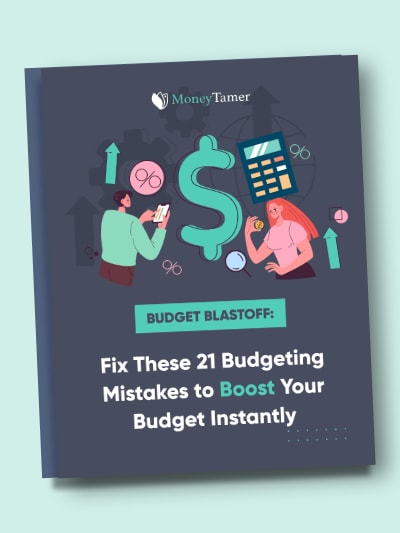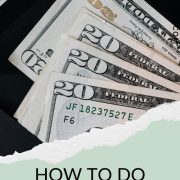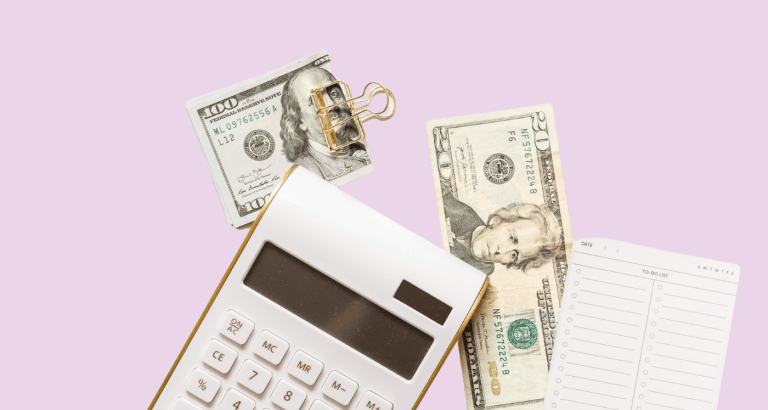How to Do Extreme Budgeting and What You Have to Give Up

Have you ever felt like your finances are a bit out of control? Are you considering trying extreme budgeting as a solution? At times, money can be tighter than you’d like. It might be due to hospital bills, debt, or just overspending.
Regardless, there’s a way to fix it. If you find that you need to save and have less money stress, you might benefit from extreme budgeting.
As an affiliate partner of various brands and sponsored content, HerPaperRoute may earn commission on qualifying purchases. Disclaimer
This is the practice of buying only what you need, not spending anything extra, and trying to find cheaper alternatives to what you do need to purchase.
Although you may not want to use this method permanently, it is a good idea to try it out for a while to save up some cash.
Maybe you’ve found yourself in a financial situation where you need to tighten up on your spending.
You could be saving up for something important, or perhaps you’re curious how much you’ll have left each month while only buying necessities.
You might even just want to see what it’s like to live on less. Whatever your reason, trying this lifestyle change can be exciting and even fun.
Extreme budgeting can be a love/hate kind of system because it’s…well, extreme.
You can save a lot of money, but you have to give up some things to get there. Here’s what extreme budgeting is all about.
How To Do Extreme Budgeting
So what are the specifics of extreme budgeting? Basically, you’re looking to eliminate anything you can from your budget.
This includes any spending that isn’t strictly essential for your life. Things like shopping for fun, going to the movies, subscriptions, and dinners out are usually not appropriate for times of extreme budgeting.
You will still pay for necessities, like rent or a mortgage, utilities, food, and car expenses. But beyond the basics, you’ll limit or completely get rid of costs.
Extreme Budgeting 101
Begin by looking at your current budget. What do you see that is non-essential? For example, you may notice that you regularly spend $30 a week on lunch. That can change.
You can also find ways to save on things you need. Here are the basic steps.
- What do you spend? Rather than looking at your ideal budget, check out what you actually spend each month or week.
- What is necessary? Find out how much of your spending is on essential things, and add up the total.
- What isn’t? Find the total cost for what you’re spending that isn’t essential.
- Change your budget to only the essentials. Switch up your current budget to reflect your more extreme version.
- Spend less on what you do buy. If you’re spending $100 a week on groceries, can you cut it to $80 and still eat well? Think about how to save on what is necessary.
- Save the money for a specific purpose. This is important. Try saving all you can for a reason and for a particular amount of time. Doing this can increase motivation and focus.
Don’t leave money on the table!
Here are some easy ways to earn extra cash on the things you already buy.
Living On An Extreme Budget
So once you’ve decided what stays and what goes, how do you handle the day-to-day life of extreme budgeting? Living with extreme frugality may take practice, but you can learn! Here are some suggestions to help you.
Related: How to Live on No Money and Survive
Extreme Frugality
Start with being as frugal as possible. Things like taking part in free activities, living simply, and other smart suggestions will help you get started.
- Give up all unnecessary spending. You knew about this one already. Cut out anything that isn’t truly needed. Needs are things that keep a roof over your head, food on the table, good health, and things that allow for communication and transport (gas, bus passes, phone and internet bills). Pretty much everything else is not necessary.
- Find free things to do. If you look around, free things aren’t usually that hard to find. Parks, having friends over, free concerts or museum days, and libraries are all free. Spend some time researching how to fill your time with free activities. You can also start looking for hobbies that don’t cost money. For example, if you currently go to an expensive gym, get rid of that membership and start running outdoors instead. Find hobbies that don’t cost anything, like hiking, reading, learning a language, or drawing. Focus on having fun while spending nothing.
- Barter for things you need. I know – extreme. But this might be simpler than you think. If you need a new pair of jeans, you can sell some things to a consignment store for store credit or maybe trade clothes with a friend. Be creative! Perhaps you know someone down the road who owns chickens and will give you some eggs in exchange for some freshly baked bread. Bartering is simple – find out what you have or can make that you can trade with someone else. Everyone gets what they need for less money.
- Live simply. Find joy in living a simple life. Take advantage of the free things you can do, like sitting outside reading, cooking with whatever is in the cupboards, or catching up with a friend. Allow life experiences to count for more than having the newest phone or clothes.

Extreme Budgeting Meal Planning Tips
Food is something that people tend to overspend on. According to the USDA, more than ⅓ of each individual dollar was spent on eating out in 2019 in the USA.
Think about it: it’s just food! It is for fueling our bodies and keeping us healthy. It doesn’t need to be fancy; it just needs to be nourishing.
It’s really a myth that good food has to be expensive. Some of the best and healthiest meals you can have are ridiculously cheap. Here’s how to cut back on grocery costs.
1. Eat foods that cost the least per pound
When you go to the grocery store, you’re going to see a lot of prices. You might want to buy something that looks like it costs the least, but it might not be the cheapest option.
For example, if there are two meat options, one is $5.00, and one is $8.00, you’ll be tempted to buy the $5.00 one. But if you look closer, you may see that the $5.00 one is only half a pound, while the $8.00 one is a whole pound.
That means the one that looks more expensive actually gets you more food for less money. When you’re working with an extreme budget, buying the least expensive option per pound is your best bet for savings.
2. Buy in bulk and eat the same meal or protein several days in a row
Buying in bulk can save you money because sometimes you can buy more food for less and need to shop less often. And after buying in bulk, make a huge meal or protein and eat it until it’s gone.
This will keep you from throwing away food unnecessarily. You won’t end up with a ton of leftovers that get tossed. You’re eating a healthy meal while also keeping yourself from overspending.
Bulk foods are a great way to meal plan. With only a few staple ingredients bought in bulk, you can add different seasonings and have them taste completely different.
3. Make foods from scratch
Many things we typically buy at the store can be made at home using ingredients you already have or at least cost you a lot less.
Examples of foods you can make from scratch are bread, cookies, yogurt, refried beans, sauces, and more. All you need is a recipe and a few ingredients that are generally cheap.
4. Make meals that require basic ingredients
While it might be fun to make a 4-course meal using exotic ingredients you’ll only use once, that is not what extreme budgeting is about. Instead, opt for meals that only need essential components.
And the fewer ingredients, the better! Try for five or less, because it can save you money. And basic ingredients are versatile – you can use them in many recipes, which will help you save time and money.
Basic ingredient meals are great for freezer meals as well. You can double or triple the recipe and freeze the extra for later.
Extreme Budget Grocery Shopping
Since grocery shopping can be super tough on an extreme budget, I want to address concerns about it. First, always shop with a list. Know what’s in your cupboards, so you don’t overspend on what you already have.
Next, don’t buy things that are expensive but unhealthy, like chips or ice cream. Your goal is to eat well using as little money as possible. Here’s how to save.
Shop for food outside the box
Cutting your grocery bills might require shopping at different places entirely. While local stores might be convenient, they often carry high prices, as well.
You can try out some new locations and think a bit differently to save money.
- Dollar Tree – you can often buy food staples at Dollar Tree for extremely low prices. While you aren’t likely to find everything you need there, you can sometimes purchase things like milk, eggs, and pasta at these stores. You may also find shampoo, deodorant, and other household items for less.
- Farmer’s Markets – Many times in the spring and summer, and sometimes in fall or winter, you can find great local farmer’s markets. Not everything will be cheaper at these locations. But you can often find deals including healthy local produce and other items. And if it’s less than it would typically cost you at a grocery store, it’s time to make a purchase.
- Discount Food Stores – Check out any stores in your neighborhood that are considered discount shops. You might notice some great finds on their shelves. One of my favorites is Aldi. I get pasta sauce, produce, and canned goods from there.
Often, shopping outside the box just means being willing to do a bit of research. Try to find places to purchase more expensive items like poultry, beef, bread, and other foods.
You’ll eventually find out what sites carry products for less. Then you’ll be an expert at saving money while grocery shopping.
Reduce Your Bills
Saving money on groceries and living frugally are both necessary for extreme budgeting. But you can probably save more money.
Try reducing your bills. This means going through each of your essential expenses and seeing if there’s any way to pay less while still getting what you need.
You can try reducing your phone and internet bills, to start. See if you can use less data and get onto a less expensive plan.
Can you find a way to get internet for free or lower your phone usage in the name of extreme budgeting? If so, you can save some money, possibly a lot of it, each month.
Another bill you can reduce is your utilities. Your electricity and water consumption are a good place to start.
If you don’t pay a flat rate, but you pay by how much you use them, start using less. Turn off lights during the day, reduce heating and cooling costs by turning air up or down when you aren’t home.
Use less water by shortening showers and only doing laundry on certain days. Then, watch your bills get lower and lower.
You may also reduce your bills by finding the things that seem like necessities, that really aren’t. Examples of this are cable or streaming services, magazine subscriptions, hair salon costs beyond just a basic haircut, and gym memberships. Save some cash by eliminating these bills entirely.

Are You Sabotaging Your Budget?
See the budgeting mistakes that are holding you back in this FREE Budgeting ebook. Fix these and your budget will blast off!
You can live on an extreme budget while planning and giving things up
Extreme budgeting may seem difficult at first, but it’s important to remember that it does accomplish the goal of saving a ton of money. You can try extreme budgeting for a few days, weeks, or even a few months if that’s best for your wallet.
Creating an extreme budget will look different for each person. But you can live on one as long as you take some time to plan correctly.
You’ll need to make peace with giving up some non-essential things for a while, such as traveling, concerts, and restaurants. But know that eventually, you’ll be able to afford some of the things you want to do if you stick to your plans.
Learn to live simply and embrace the extreme budgeting life. The rewards are enormous and can include increased contentment with what you have, more savings, less debt, and ultimately, more freedom. Even if it takes a while to get the hang of it, extreme budgeting is possible, and you can do it!
Related Articles:

Follow along on Instagram!










